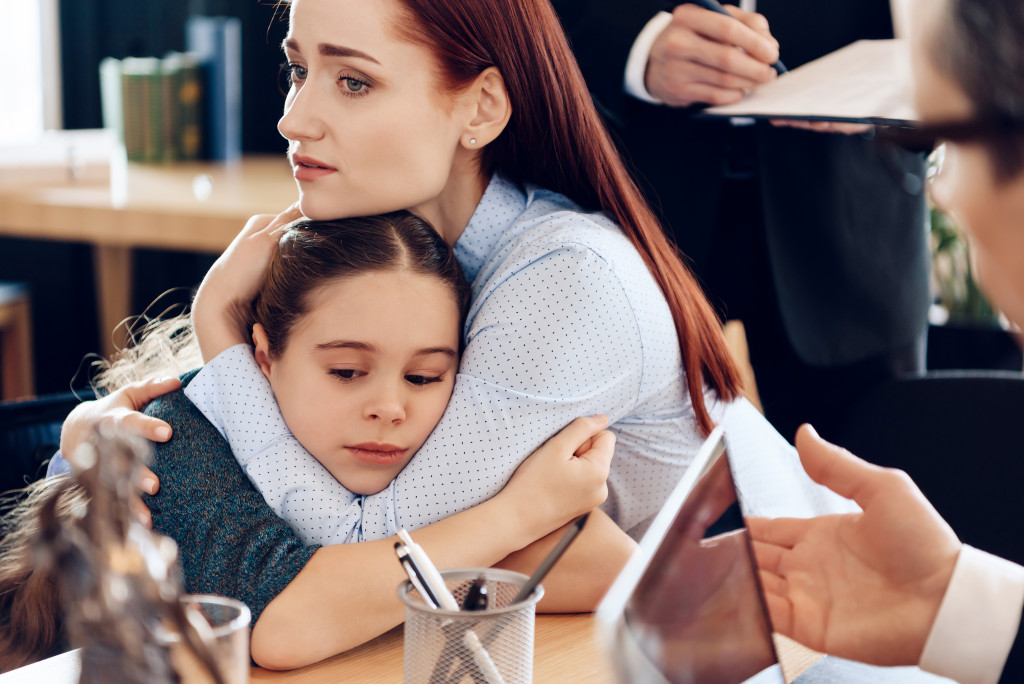Divorces can be messy. Even if you’re lucky enough to get a great family lawyer, your family will still undergo a lot of pain. The divorce process can suck you in. It can be exhausting for most people or exciting for some. Either way, being free from a problematic marriage is ideal. But keep in mind that the children will be stuck in an equally, if not more problematic situation.
Studies show that children of divorce show higher depression rates compared to those living with both parents. But don’t let that stop you from choosing to let go of a joyless marriage. Instead, use that information as an inspiration to focus more on how you can help your children cope with life pre, mid, and post-divorce.
Breaking the news of the divorce
A decision as big as this doesn’t happen overnight. 80% of the time, children, unbeknownst to their parents, see and understand what goes on in the marriage and why it’s failing. If possible, talking to your children together is ideal. Show them that it’s a mutual decision. And if they’re already of age, asking their input about the divorce might also prove to be helpful.
To encourage your children to honestly talk about their feelings in the future, you must also be honest when breaking the news of the divorce. Be as transparent as you can be, considering their ages and comprehension levels.
- Young children ages 10 and below might find it hard to understand the concept of divorce. They might not get why they have to spend two Christmases in different homes. Ensure them that even if you aren’t staying in the same home, you still care about each other. Help them avoid the disillusion that divorces bring.
- Children in their preteens might think that the divorce is their fault. They are also more susceptible to bullying at school if the news gets out. Make sure that you stay consistent in letting them know that it wasn’t their fault.
- Teenagers have more maturity and can understand why a divorce is necessary. But they are also prone to show more emotions. For most teenagers, the changes that divorce will create might be the biggest problem. And due to this, they likely blame one or both parents for the failure of the marriage.
Answering Questions

Investing time and patience in helping them understand what will happen is crucial to their mental health. Prepare to answer these questions together as early as possible.
- What did I do wrong?
- Why don’t you love each other anymore?
- Will you get back together?
- What can I do to get you back together?
- Will you leave me?
- Where will I live? Why?
- What am I going to tell my friends?
- Will the both of you be at my birthday?
- Will I have two moms and two dads?
Like your answers to these questions, your plans regarding your children must be consistent and equal.
If possible, avoid pitting your children against your spouse. Getting back at your spouse to feel the satisfaction of winning your children’s affection at the expense of their mental health is not only unethical but can also be used against you in a court of law.
There cannot be one cool parent and one strict parent. Even if your marriage has already ended, try your best to consistently share the work, the responsibilities, and the benefits of having your children.
The consistency of having equal roles in your children’s lives is detrimental to their mental and emotional stability and the values they will hold as they grow up.
Along with the depression and possible anger you’re feeling, exhaustion from the divorce might hinder you from seeing the divorce’s effects on your children. And if the separation turns into a custody battle, those effects might get worst as you get more blinded by your feelings and worries.
Do everything in your power to understand and respect the way your children cope. Don’t force them to talk but always remind them that you’re there to listen. Don’t pressure them to understand but make sure you help them get there.
If possible, actively get help from their friends. Know that there are people who care about your children outside of your family. They aren’t alone. Make your children’s lives more comfortable by opening your home to their friends.
It can be a good way to ensure that they feel supported, whether the support is from you or not. However, make sure you avoid asking their friends how they are. No matter how concerned you are, the news of you asking about them will get to them. And they might see it as your way of spying on them. Ensuring that they have a space to safely communicate their feelings is the priority.
From the moment you break the news, to the divorce process, and ultimately the life after the separation, your children will constantly be affected as much, if not more than the both of you. Even if your marriage is unsalvageable, the negative impacts of the divorce in your children’s lives might still be lessened.

